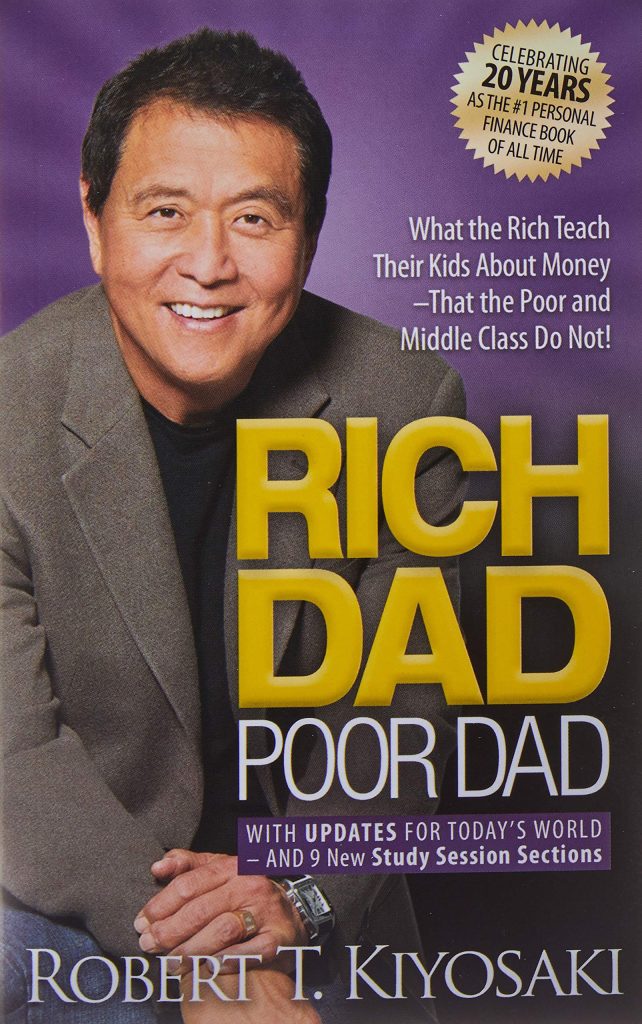Rich Dad Poor Dad: What the Rich Teach Their Kids About Money That the Poor and Middle Class Do Not!
Rich Dad Poor Dad by Robert T. Kiyosaki is a personal finance classic that contrasts the financial philosophies and practices of Kiyosaki’s two father figures: his biological father (Poor Dad) and his best friend’s father (Rich Dad). Through these contrasting perspectives, Kiyosaki imparts valuable lessons on money, investing, and wealth-building.
The book’s main themes include.
– The importance of financial education
– The difference between assets and liabilities
– The need to take calculated risks
– The power of financial independence
– The importance of building multiple streams of income
The book challenges conventional beliefs about money and wealth, and offers practical advice on how to build wealth and achieve financial freedom. It has been a bestseller and has been translated into many languages.
The book “Rich Dad Poor Dad” is divided into four parts:
◦ Chapters 1-10: The author’s upbringing and how he learned the difference between financial education and financial literacy from his rich dad and poor dad.
◦ Chapters 11-19: The author’s explanation of assets and liabilities.
◦ Chapters 20-29: The author’s explanation of how to create a cash flow system.
◦ Chapters 30-36: The author’s explanation of the four quadrants of financial freedom.
Robert Kiyosaki – Author of Rich Dad Poor Dad Book
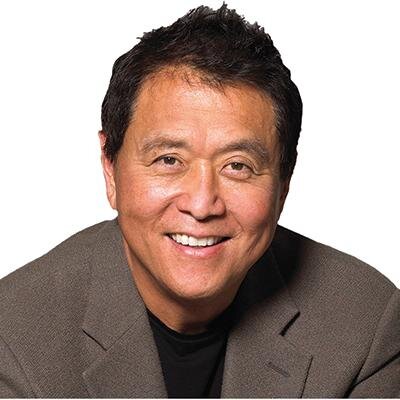
Robert Kiyosaki, born on April 8, 1947, is an American entrepreneur, businessman and author. Robert Kiyosaki is the author of more than 26 books, including the international self-published personal finance Rich Dad Poor Dad series of books which have been translated into 51 languages and sold over 41 million copies worldwide.
Rich Dad Poor Dad: Book Summary
Kiyosaki contrasts the financial mindsets and strategies of his two fathers, showcasing their different approaches to money and how they influenced his own thinking. Poor Dad, despite being highly educated and working as a government employee, struggled with financial stability and lived paycheck-to-paycheck. In contrast, Rich Dad, a self-made entrepreneur and investor, attained significant wealth and financial independence.
The book introduces various key principles that contribute to the divergence in financial outcomes between Poor Dad and Rich Dad. One of the central themes is the importance of financial literacy. Kiyosaki argues that our education system fails to provide practical knowledge about money management and investments, leaving many people ill-prepared for financial success. He emphasizes the need to educate oneself about financial matters and acquire the skills to make sound financial decisions.
“Rich Dad Poor Dad” by Robert Kiyosaki is a best-selling personal finance book that challenges conventional notions about wealth and provides a unique perspective on achieving financial success. The book revolves around Kiyosaki’s childhood and the lessons he learned from his two fathers: his own dad, referred to as “Poor Dad,” and his best friend’s dad, known as “Rich Dad.”
Kiyosaki also highlights the value of assets and liabilities. He distinguishes between assets, which generate income and appreciate in value, and liabilities, which drain money from one’s pocket. By focusing on acquiring income-generating assets and minimizing liabilities, Kiyosaki argues that individuals can build wealth and achieve financial independence.
Additionally, “Rich Dad Poor Dad” emphasizes the importance of adopting a mindset of entrepreneurship and investing. Kiyosaki encourages readers to think beyond traditional employment and explore avenues for creating their own businesses or investing in real estate, stocks, or other income-producing ventures. He promotes the idea of generating passive income streams that can provide financial stability and opportunities for wealth growth.
The book challenges the notion that a high income guarantees financial security. Kiyosaki argues that it is not the amount of money one earns but how effectively that money is managed and invested that determines financial success. He emphasizes the significance of cultivating financial discipline, making informed financial decisions, and constantly seeking opportunities for growth and learning.
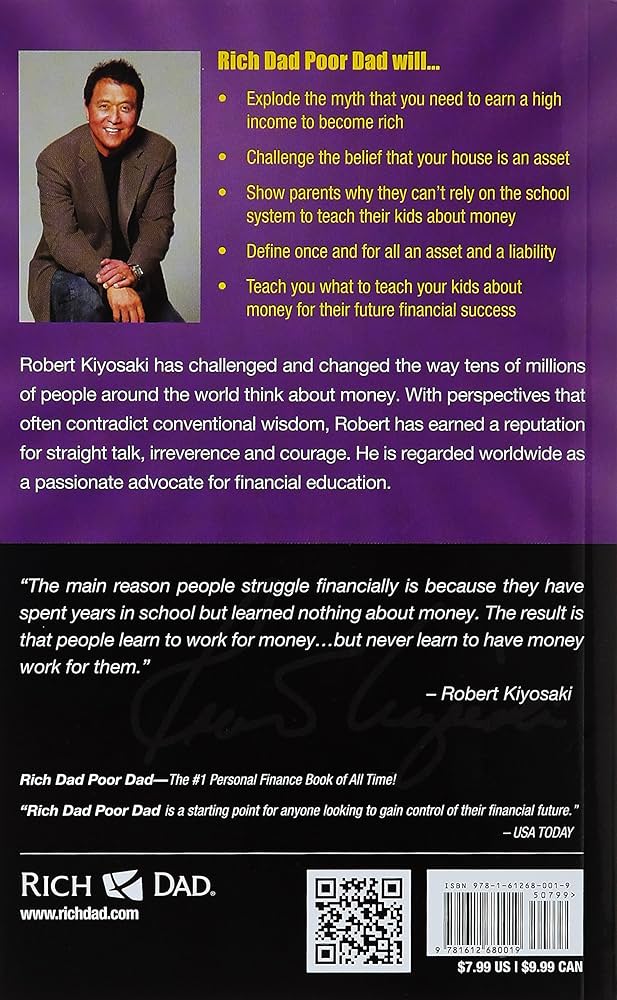
Rich Dad Poor Dad Summary of Key Lessons and Review
“Rich Dad Poor Dad” by Robert Kiyosaki is a personal finance classic that imparts valuable lessons about money, wealth-building, and mindset.
Here are 10 lessons from the book:
1. The Importance of Financial Education: Kiyosaki emphasizes the significance of financial education, arguing that understanding money, investing, and how to make it work for you is crucial for building wealth.
2. Assets vs. Liabilities: The book introduces the concept of assets and liabilities, stressing the importance of acquiring income-generating assets and minimizing liabilities to achieve financial success.
3. The Rat Race: Kiyosaki challenges the traditional idea of working for a paycheck and advocates for breaking free from the “rat race.” He encourages readers to seek financial independence and build passive income streams.
4. Entrepreneurial Mindset: “Rich Dad Poor Dad” promotes an entrepreneurial mindset, encouraging readers to think like business owners and investors rather than just employees. Kiyosaki highlights the value of creating and investing in businesses.
5. The Power of Leverage: The book discusses the strategic use of leverage, such as using other people’s money (OPM) and time, to maximize investment returns and accelerate wealth-building.
6. Taking Calculated Risks: Kiyosaki suggests that taking calculated risks is essential for financial success. He encourages readers to overcome fear and educate themselves to make informed decisions in the realm of investments and entrepreneurship.
7. Learn to Make Money Work for You: Instead of solely working for money, Kiyosaki advocates for making money work for you. This involves investing in income-generating assets and allowing compounding to grow wealth over time.
8. The Importance of Mindset: The book stresses the significance of developing a positive and proactive mindset towards money. Kiyosaki emphasizes that one’s beliefs and attitudes about money play a crucial role in financial success.
9. Building Passive Income: Kiyosaki emphasizes the importance of creating passive income streams, such as investments in real estate or businesses, which can provide a steady flow of income with less active involvement.
10. Continuous Learning: “Rich Dad Poor Dad” underscores the idea that learning about money and investing is an ongoing process. Kiyosaki encourages readers to continuously seek knowledge and adapt to changing economic conditions.
By incorporating these lessons into your financial life, you can take significant steps toward achieving financial independence and security.
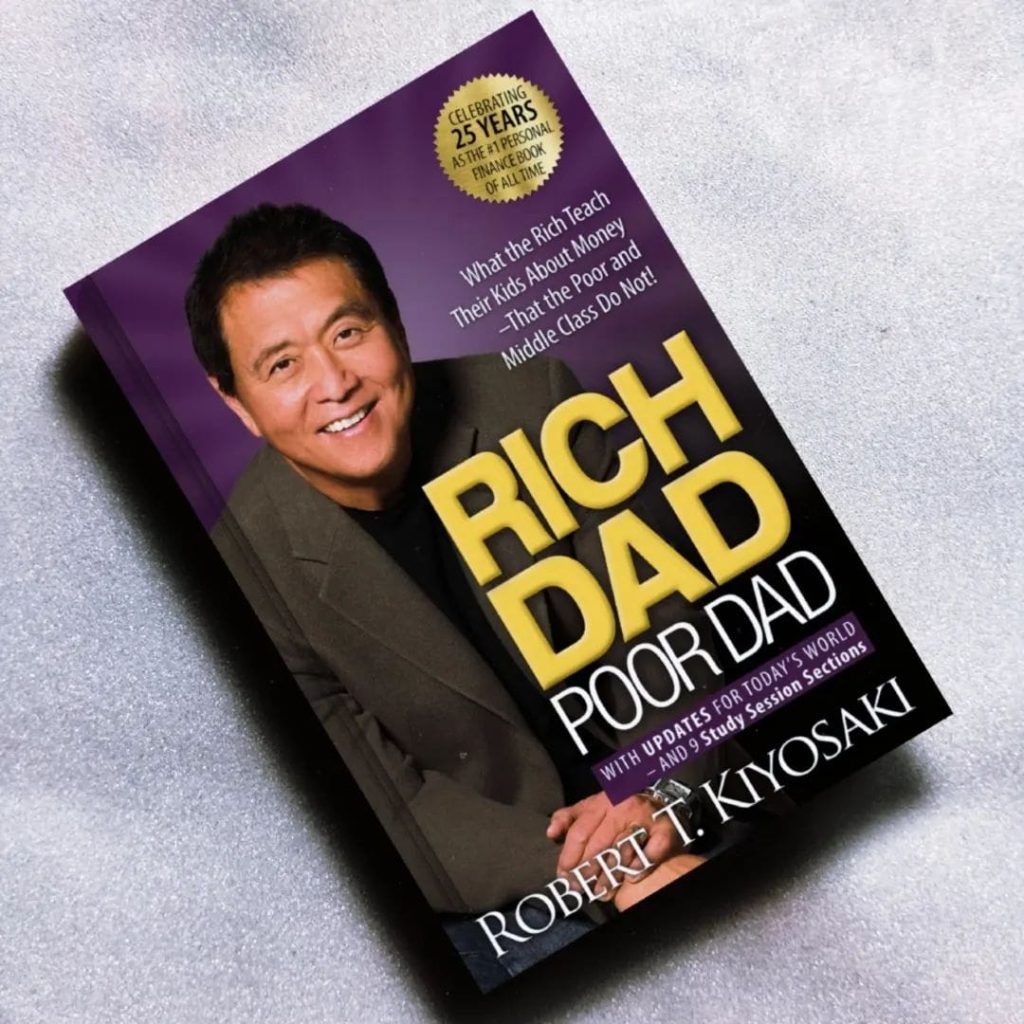
Final Thoughts: Rich Dad Poor Dad
“Rich Dad Poor Dad” by Robert T. Kiyosaki provides crucial insights into personal finance, wealth-building, and the mindset necessary for financial success. Through the lessons of financial education, the importance of understanding assets and liabilities, the value of entrepreneurship, and the necessity of a growth-oriented mindset, Kiyosaki equips readers with the tools to take control of their financial futures. The book serves as a call to rethink traditional approaches to money and empowers individuals to pursue financial independence and prosperity.

Rich Dad, Poor Dad Quotes by Robert T. Kiyosaki
Robert Kiyosaki always inspires and pushes toward financial success. Sharing with you the best quotes from the Rich Dad Poor Dad Book by Robert Kiyosaki.
01. “In the real world, the smartest people are people who make mistakes and learn. In school, the smartest people don’t make mistakes.”
02. “Winners are not afraid of losing. But losers are. Failure is part of the process of success. People who avoid failure also avoid success.”
03. “It’s not what you say out of your mouth that determines your life, it’s what you whisper to yourself that has the most power!”
04. “It’s more important to grow your income than cut your expenses. It’s more important to grow your spirit that cut your dreams.”
05. “Don’t be addicted to money. Work to learn, don’t work for money. Work for knowledge.”
06. “A mistake is a signal that it is time to learn something new, something you don’t know before.”
07. “A winning strategy must include losing.”
08. “Failure inspires winners. And failure defeats losers. It is the biggest secret of winners. It’s the secret that losers do not know. The greatest secret of winners is that failure inspires winning; thus, they’re not afraid of losing.”
09. “In today’s fast-changing world, it’s not so much what you know anymore that counts, because often what you know is old. It is how fast you learn. That skill is priceless.
10. “Always start at the end before you begin. Professional investors always have an exit strategy before they invest. Knowing your exit strategy is an important investment fundamental.”
11. “Everything the working class has been told to do, the rich do not do. That is my message.”
12. “Forget the Camel. If a man can pass through the eye of the needle, he will enter the world of tremendous wealth.”
13. “If you want to go somewhere, it is best to find someone who has already been there.”
14. “In the real world, the smartest people are people who make mistakes and learn. In school, the smartest people don’t make mistakes.
15. The size of your success is measured by the strength of your desire; the size of your dream; and how you handle disappointment along the way.
16. Business is like a wheelbarrow. Nothing happens until you start pushing.
17. “The philosophy of the rich and the poor is this: the rich invest their money and spend what is left. The poor spend their money and invest what is left.”.
18. In today’s rapidly changing world, the people who are not taking risk are the risk takers.
19. “Losers quit when they fail. Winners fail until they succeed.”
20. Skills make you rich, not theories.
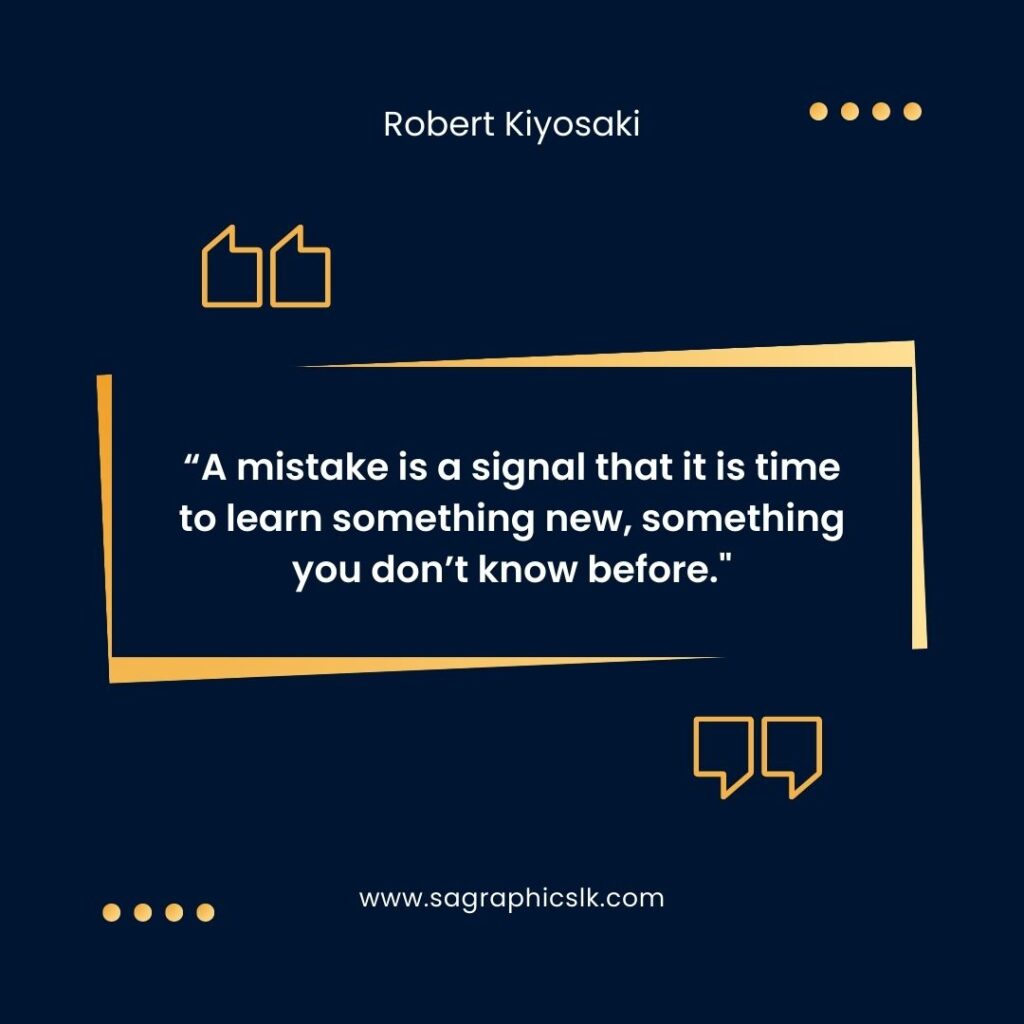
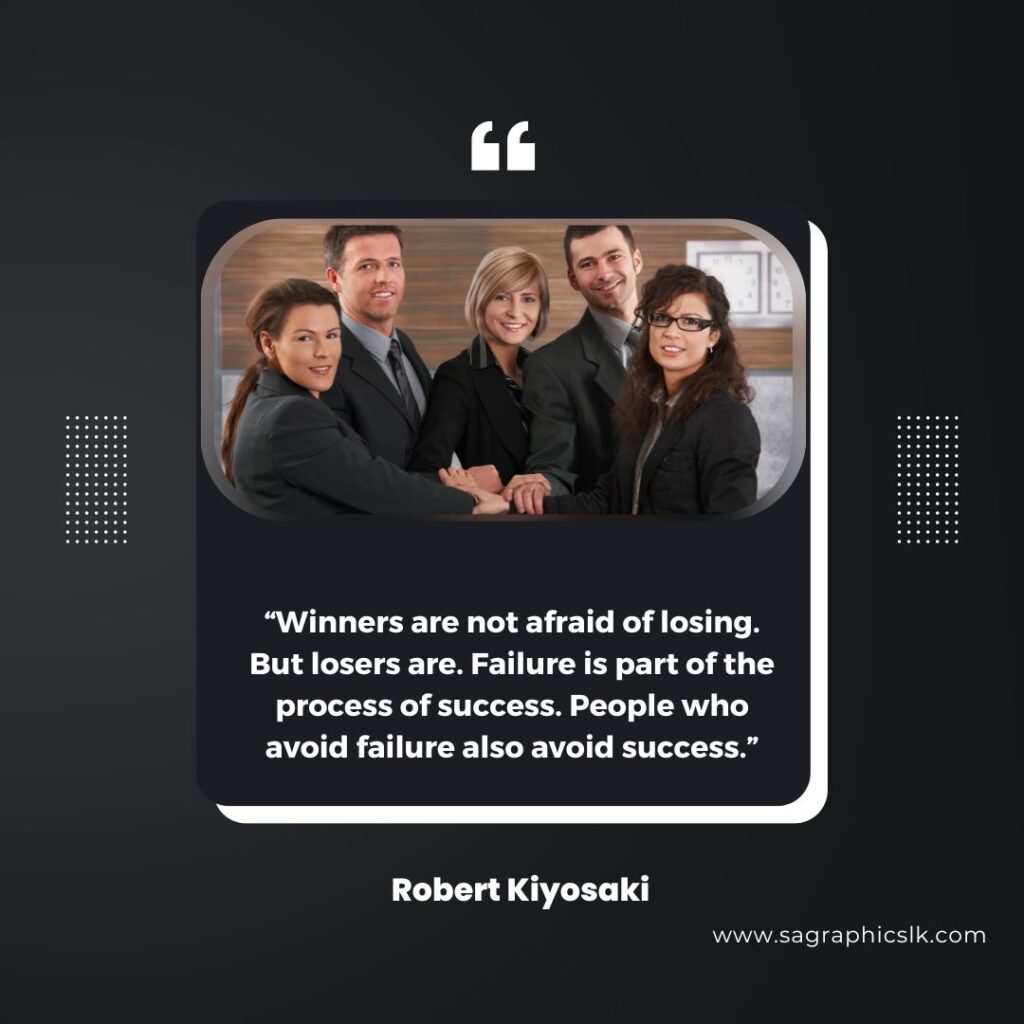
Thanks for reading the post (Rich Dad Poor Dad by Robert Kiyosaki) and we’ll see you on the next one!
For More Blog Posts: Click Here
Affiliate Disclosure: As an Amazon Associate, I earn from qualifying purchases. This blog post may contain other affiliate links as well by which I earn commissions at no extra cost to you.

